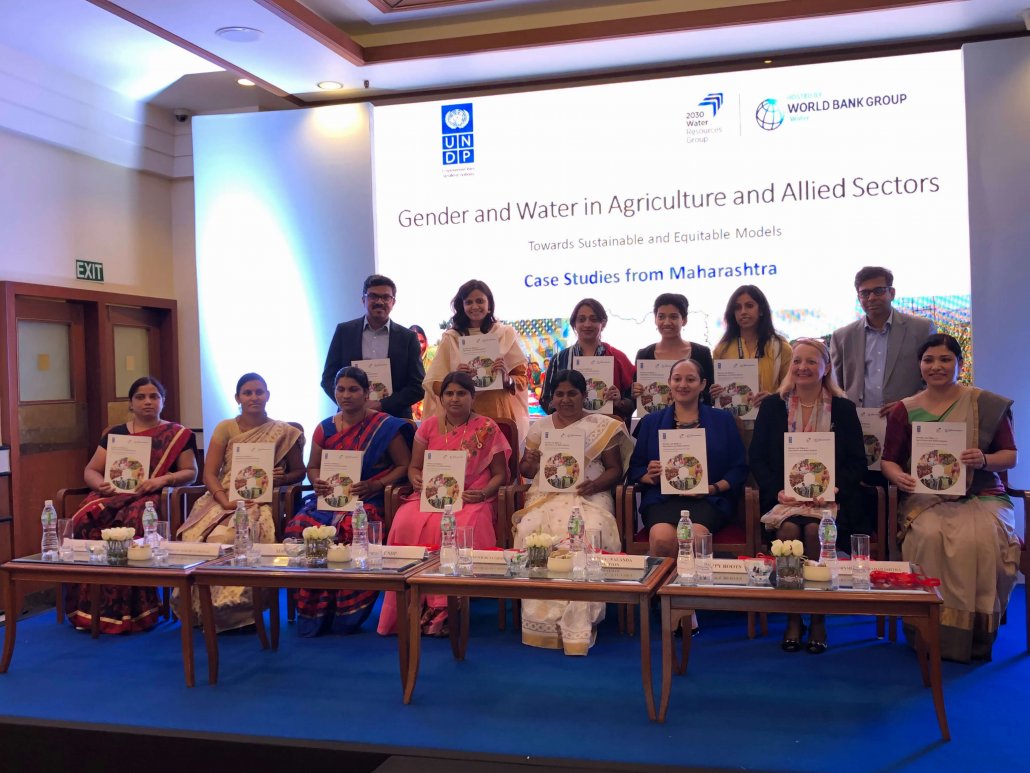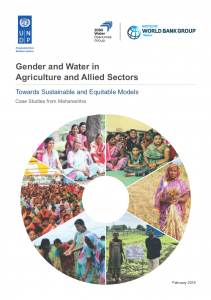Rural women take lead roles to demonstrate innovations in agricultural production systems
PRESS RELEASE – FOR IMMEDIATE RELEASE
Joint publication by 2030 WRG and UNDP unveils innovative and sustainable partnership and financing models towards Gender and Water in agriculture and allied sectors in Maharashtra
February 26, 2019, Mumbai, India – Today the publication ‘Gender and Water in Agriculture and Allied Sectors’ was launched, developed jointly by 2030 Water Resources Group, a public -private-civil society partnership hosted by the World Bank Group, and the United Nations Development Programme, India. The publication showcases five successful case studies of women-led growth and entrepreneurship through their participation in agricultural production systems and allied sectors, supported by the collaboration and intervention of public and private sector, and civil society organizations.
 Agriculture in India continues to be at the mercy of unpredictable weather patterns and acute shortage of sustainable water resources. In addition, the existing gender gap prevents women from effectively contributing to improved agricultural productivity.
Agriculture in India continues to be at the mercy of unpredictable weather patterns and acute shortage of sustainable water resources. In addition, the existing gender gap prevents women from effectively contributing to improved agricultural productivity.
Research suggests that increasing women’s labor force participation by 10% could add $700 billion to India’s GDP by 2025. Presenting the report, Maharashtra Chief Minister Shri Devendra Fadnavis said, “The Government of Maharashtra is committed towards creating livelihood opportunities for women. The success of self-help groups and microfinance movements in Maharashtra is a testament to the potential of collective action by India’s rural women.”
For instance, the report highlights scalable, innovative interventions in the agricultural sector to address the challenge of water resources management, use of technology for improved agricultural practices and sustainable value chains, while embedding initiatives that empower women economically and socially. These are:
- Project Disha of UNDP removes gender barriers in post-harvest management in the drought-prone region of Western Vidarbha, through a group of 30 women sourcing managers (WSMs)
- Swayam Shikshan Prayog makes farming economically viable for women farmers in Marathwada region through its ‘one-acre model’ also known as Women-led climate resilient farming model
- Sahyadri farms, unlocks value chains for small and marginal farmers through sustainable agriculture practices and enhanced market access
- The Goatry Project improves the value chain economics of goat-rearing, a predominant form of livelihood for communities living in the water-scarce regions of western Maharashtra
- Happy Roots, a socially-conscious food company that empowers women and small farmers through a responsible supply chain
These case studies, at the intersection of water, gender and agriculture, are closely aligned with eight 2030 Sustainable Development Goals (SDGs) of the United Nations.
Speaking at the launch event, Ms. Nadia Rasheed, Deputy Country Director, UNDP India, said, “At UNDP, we believe that effective collaboration with governments as well as private sector is key to achieving the Sustainable Development Goals. Our Project Disha has explored a unique model that creates direct links between farmers, private sector companies and the market for women producers and their families.”
Project Disha, a partnership between UNDP India and India Development Foundation, supported by IKEA Foundation, demonstrates a successful public and private sector collaboration. Under the pilot in Vidarbha, UNDP India collaborated with Future Group to train 30 women from Mahila Arthik Vikas Mahamandal’s (MAVIM) Self-Help Groups (SHGs) in areas such as procurement management, grading, market analysis, buying and pricing strategies, storage basics, and soft skills and communication.
These 30 women, known as Women Sourcing Managers (WSMs), trained women farmers across the west Vidharbha region, creating a baseline of 5600 women farmers, who are now breaking gender stereotypes by taking a leading role in agriculture practices, with activities such as goat-rearing, poultry farming, dal mills production, etc., availing internal loans from their savings groups and generating household income.
“These are stories of empowerment, of courage and strength to improve the community and the village, and of dynamic and enterprising women who are contributing to their household income. The demonstration projects highlighted in this report have benefited 50,000 women so far, offering numerous policy directions to reach scale” said Ms. Karin Krchnak, 2030 WRG Program Manager, World Bank Group.

Download the report (4MB, PDF) >>
# # #
About 2030 Water Resources Group
The 2030 Water Resources Group (2030 WRG) is a public, private, civil society partnership hosted by the World Bank Group. The partnership supports country-level collaboration designed to unite diverse groups with a common interest in the sustainable management of water resources.
Global partners include bilateral agencies and governments (Swiss Development Cooperation,
Swedish Development Cooperation, the governments of Hungary and Israel), private companies (Nestlé, PepsiCo, Coca-Cola, Dow Chemical, Ab InBev), development banks (IFC, World Bank, African Development Bank, Inter-American Development Bank), INGOs and IGPs (UNDP, GGGI, GWP, the World Economic Forum, BRAC and IUCN). The 2030 WRG was launched in 2008 at the World Economic Forum and has been hosted by The World Bank Group since 2012.
About UNDP
On the ground in about 170 countries and territories, UNDP works to eradicate poverty while protecting the planet. We help countries develop strong policies, skills, partnerships and institutions so they can sustain their progress.
UNDP has worked in India since 1951 in almost all areas of human development, from democratic governance to poverty eradication, to sustainable energy and environmental management. UNDP’s programmes are aligned with national priorities and are reviewed and adjusted annually.
For further information contact:
Ms Alida Pham
Communications Lead, 2030 WRG
Phone: +1 202 823 6896, apham4@worldbank.org
World Bank Group, Washington DC
Ms Karishma Gupte
Maharashtra Program, 2030 WRG
Phone: kgupte@worldbank.org
World Bank Group, India
Ms Astha Alang
Senior Communication Officer, UNDP
Phone: +91 9873678129, astha.alang@undp.org
UNDP India
